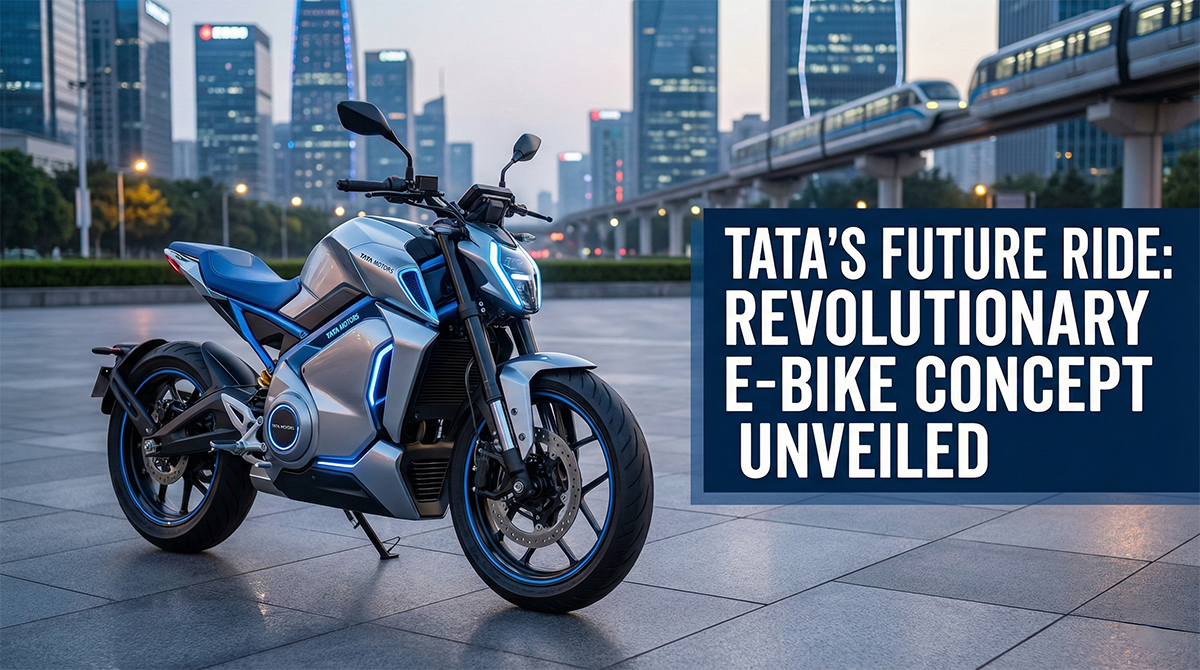Tata Motors, one of India’s most respected automobile brands, is preparing to enter the electric two-wheeler market with its first electric bike. This upcoming launch is expected to be a major milestone, as Tata expands its electric mobility vision beyond cars and into the fast-growing two-wheeler segment.
With the Indian market rapidly shifting toward cleaner and more sustainable transportation, Tata’s move signals a strong commitment to future-ready mobility solutions designed specifically for Indian roads and riders.
Why the Electric Bike Market Is Booming in India
The demand for electric two-wheelers in India has grown significantly in recent years. Rising petrol prices, increasing awareness of environmental issues, and government support for electric vehicles have pushed many consumers to consider electric alternatives.
Electric bikes are especially appealing to urban commuters because they offer:
- Lower running and maintenance costs
- Zero tailpipe emissions
- Smooth and silent riding experience
- Long-term savings compared to petrol bikes
Seeing this shift, Tata Motors’ decision to enter the electric bike space appears both timely and strategic.
What to Expect from Tata Motors’ Electric Bike
Although Tata Motors has not officially disclosed full specifications yet, early expectations suggest that the electric bike will be designed with everyday commuters and modern riders in mind.
Stylish and Modern Design
The bike is expected to feature a bold, futuristic design with clean lines and aerodynamic styling. Tata is known for blending practicality with contemporary aesthetics, and the electric bike is likely to follow the same philosophy—appealing to young riders and professionals alike.
Impressive Riding Range
The electric bike is rumored to offer a range of around 150 to 200 kilometers on a single charge, making it suitable for daily commuting as well as short highway rides. This range would place it among the more competitive electric bikes in the Indian market.
Fast Charging Support
Fast charging is expected to be one of the key highlights. The battery may support rapid charging technology, allowing riders to charge a major portion of the battery within a short time—ideal for busy city lifestyles.
Smart and Connected Features
Tata’s electric bike may come equipped with smart connectivity features such as:
- Smartphone pairing
- Digital instrument cluster
- Ride statistics and alerts
- Navigation assistance
These features would enhance both convenience and safety for riders.
Battery Technology and Performance
Battery performance plays a crucial role in any electric vehicle, and Tata Motors is likely to leverage its experience in electric car battery systems. The bike is expected to use a high-quality lithium-ion battery designed for efficiency, durability, and long service life.
Advanced features such as regenerative braking could also be included, helping to recharge the battery slightly during braking and improving overall efficiency.
The electric motor is expected to deliver smooth acceleration, instant torque, and reliable performance for urban and semi-urban conditions.
Manufacturing Approach and Expected Pricing
Tata Motors is expected to manufacture its electric bike in India, supporting local production and keeping costs under control. This approach could also help ensure better availability of spare parts and service support across the country.
In terms of pricing, the electric bike is likely to be positioned in the mid-range to premium segment, balancing quality, technology, and affordability. While the exact price is yet to be announced, it is expected to be competitive enough to attract both first-time EV buyers and existing two-wheeler users looking to switch to electric.
Competition and Market Impact
The Indian electric two-wheeler market already includes several strong players. However, Tata Motors brings unique advantages:
- Strong brand trust
- Nationwide dealership and service network
- Proven expertise in electric vehicle technology
- Focus on safety and build quality
The launch of Tata’s electric bike could raise competition standards, push innovation, and encourage wider adoption of electric two-wheelers across India.
How This Launch Could Shape the Future
Tata Motors entering the electric bike segment could accelerate India’s transition toward sustainable personal transportation. It may also encourage traditional petrol bike users to explore electric alternatives with confidence, thanks to Tata’s reputation and reliability.
If successful, this electric bike could become a popular choice for daily commuters, students, and professionals seeking a smart, eco-friendly, and cost-effective riding solution.
The upcoming electric bike from Tata Motors represents more than just a new product—it reflects a broader shift toward clean and intelligent mobility in India. With modern design, promising range, smart features, and Tata’s engineering strength, this electric bike has the potential to make a strong impact in the two-wheeler EV market.
As anticipation builds, all eyes are on Tata Motors to see how this electric bike will redefine urban commuting and shape the future of two-wheel transportation in India.




